Are you in search of a mustard seed substitute that can deliver the same flavors to your dishes? Or maybe you just can’t find mustard seeds nearby and need an alternative? Look no further!
In this comprehensive guide, we will explore various options for swapping mustard seeds in your recipes. From prepared mustard to mustard oil, we’ve got you covered with numerous alternatives to choose from.
Table of Contents
Key Takeaways:
- Mustard seed substitutes are readily available and can be found in your pantry or local grocery stores.
- Prepared mustard and mustard powder are common substitutes and can deliver similar flavors to your dishes.
- Mustard paste and mustard oil can add unique flavors to your recipes.
- Experimenting with other spices and seeds can also offer alternative taste profiles.
- Considering dietary restrictions and allergies is important when selecting a substitute.
Understanding Mustard Seeds and Their Uses
Mustard seeds come from the mustard plant, which is a member of the Brassicaceae family. These seeds are small, round, and have a brownish-yellow color. They are commonly used as a spice in Indian, Mediterranean, and Middle Eastern cuisines.
Mustard seeds have a pungent and slightly bitter taste. They are often used in pickling, salad dressings, marinades, and sauces. Mustard seeds can also be toasted and used as a topping for dishes like roasted vegetables, meats, and sandwiches.
Types of Mustard Seeds
There are three main types of mustard seeds:
| Seed Type | Description |
|---|---|
| Yellow Mustard Seeds | Also known as white mustard seeds, these are the mildest type of mustard seeds and are commonly used in American yellow mustard. |
| Brown Mustard Seeds | These have a more pungent flavor and are used in European and Asian cuisines. |
| Black Mustard Seeds | These have the strongest flavor and are commonly used in Indian and Middle Eastern dishes. |
When using mustard seeds in recipes, it’s important to use the appropriate type based on your desired flavor profile.
Substitutes for Mustard Seeds
If you don’t have mustard seeds on hand or want to try something different, there are several substitutes available:
- Prepared Mustard
- Mustard Powder
- Mustard Paste
- Mustard Oil
- Other Spices and Seeds
Each substitute offers a unique flavor and texture, so it’s important to choose the one that works best for your recipe.
Prepared Mustard: A Mustard Seed Substitute
When it comes to finding a convenient and flavorful alternative to mustard seeds, look no further than prepared mustard. This popular condiment is readily available in most grocery stores and offers a similar taste profile to mustard seeds.
Prepared mustard is made by combining ground mustard seeds with vinegar and other spices, resulting in a smooth and tangy spread. It comes in various types such as yellow mustard, Dijon mustard, and whole-grain mustard, each with its own distinct flavor.
| Prepared Mustard Type | Flavor Profile | Best Used In |
|---|---|---|
| Yellow Mustard | Mild, tangy | Dressings, marinades, sandwiches |
| Dijon Mustard | Sharp, spicy | Sauces, gravies, glazes |
| Whole-Grain Mustard | Robust, textured | Meat rubs, cheese plates, dips |
Yellow mustard is the mildest of the three and can be used as a 1:1 substitute for mustard seeds in most recipes. Dijon mustard is best suited for recipes that require a stronger flavor, while whole-grain mustard adds texture to dishes.
If you’re looking for a healthier option, opt for organic or low-sodium prepared mustard to avoid added sugars and artificial flavors. Keep in mind that prepared mustard may alter the color of your dish, so adjust your recipe accordingly.
Next time you run out of mustard seeds, reach for a jar of prepared mustard instead. It’s a versatile and tasty substitute that will elevate your dishes.
Mustard Powder as a Mustard Seed Substitute
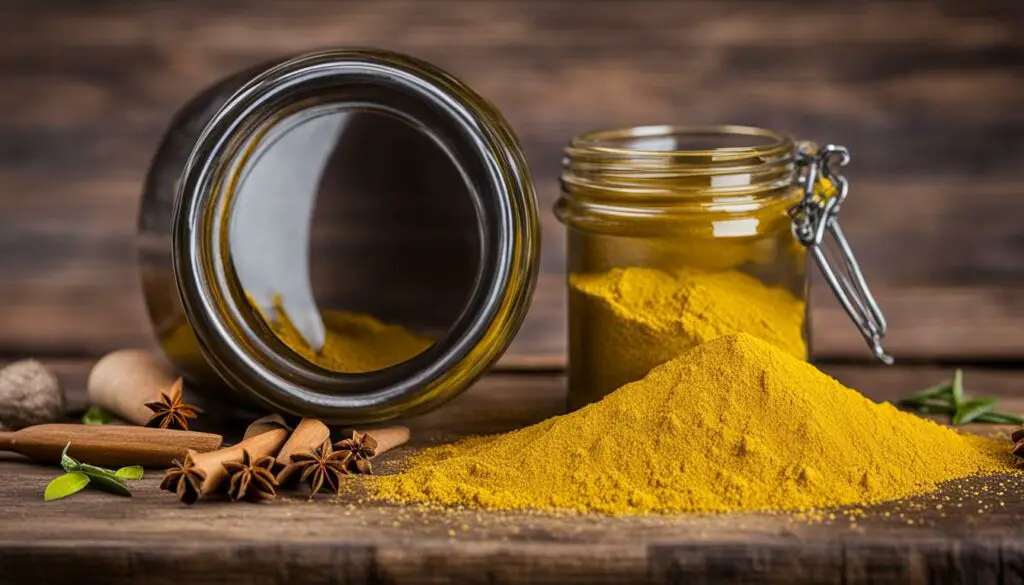
Mustard powder is a versatile and convenient substitute for mustard seeds. It is made from ground mustard seeds and offers a similar flavor profile, which makes it a popular choice for use in various recipes.
To use mustard powder as a substitute for mustard seeds, start by mixing it with water to form a paste. The paste can then be used in the recipe in place of the mustard seeds. Keep in mind that mustard powder has a more intense flavor than whole mustard seeds, so adjust the amount used accordingly.
One advantage of using mustard powder is that it is readily available in most grocery stores. It is also shelf-stable and can be stored in a cool, dry place for up to 6 months.
| Pros | Cons |
|---|---|
| Readily available in most grocery stores | More intense flavor than whole mustard seeds |
| Convenient and easy to use | May alter the texture of the recipe |
| Shelf-stable for up to 6 months |
Overall, mustard powder is a convenient and easy-to-use substitute for mustard seeds. It is readily available and offers a similar flavor profile, making it a great option for most recipes.
Mustard Paste
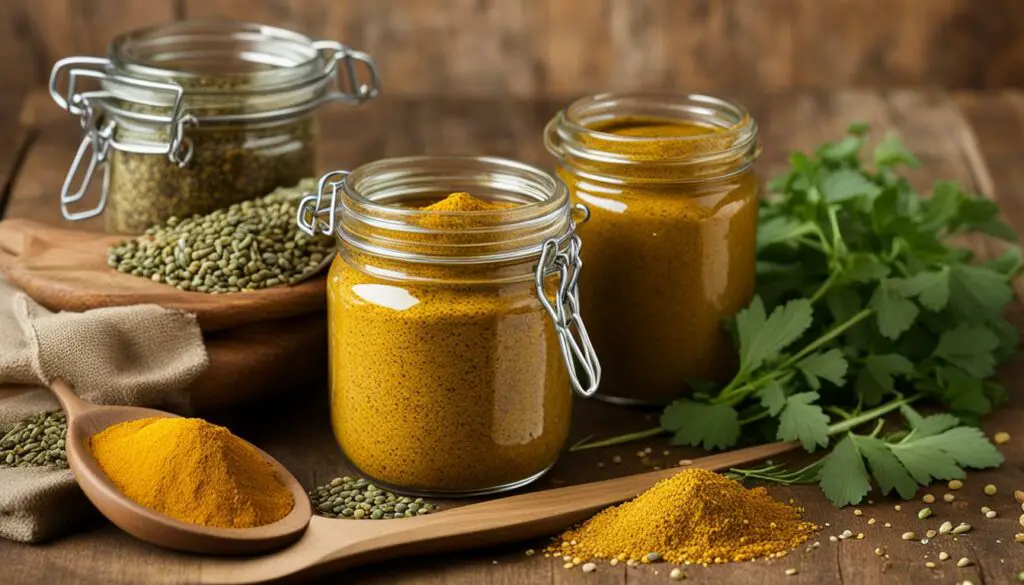
Mustard paste is a flavorful alternative to mustard seeds, commonly used in Indian cooking. It can add a unique taste to your recipes and is relatively easy to make at home.
To make mustard paste at home, you’ll need mustard seeds, water, salt, and vinegar. Simply grind the mustard seeds and mix them with water to create a paste. Add a pinch of salt and a splash of vinegar to enhance the flavor.
Mustard paste can be used as a substitute for mustard seeds in recipes such as marinades, dressings, and sauces. Its pungency and tangy flavor make it a suitable alternative for those looking to add some kick to their dishes.
| Pros | Cons |
|---|---|
| Adds a unique taste | Can be difficult to find pre-made |
| Easy to make at home | Can be too spicy for some |
| Offers a tangy flavor | Not suitable for those with mustard allergies |
If you’re using mustard paste as a substitute in a recipe, keep in mind that its consistency may be different from mustard seeds. Adjust the amount of liquid in the recipe as needed to achieve the desired texture.
Overall, mustard paste is a flavorful and easy-to-make alternative to mustard seeds that can add a unique taste to your dishes. Give it a try in your next recipe!
Mustard Oil as a Mustard Seed Substitute
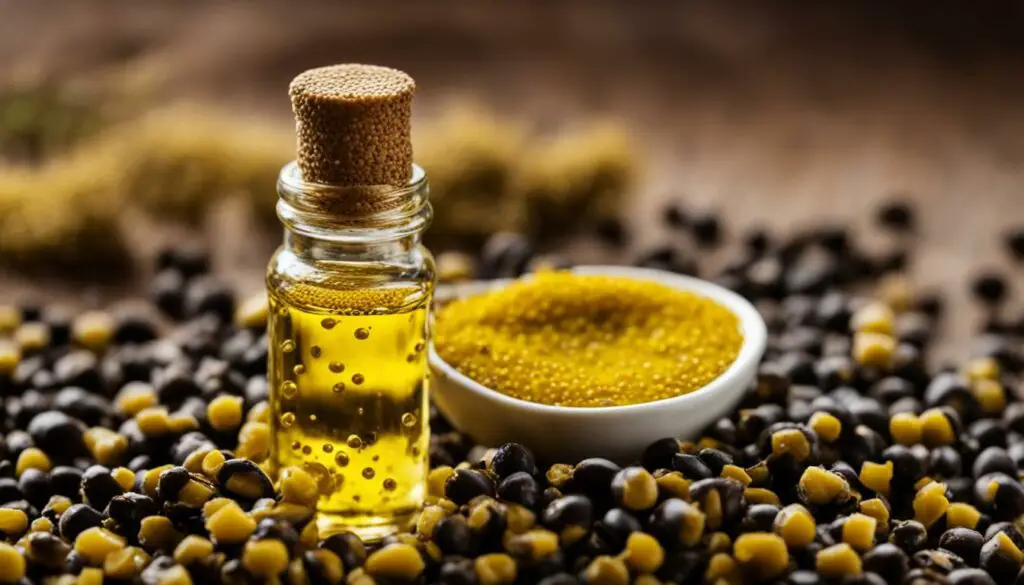
Mustard oil, made from mustard seeds, can be a unique and flavorful substitute for mustard seeds in your recipes. This oil is commonly used in Eastern and Northern Indian cuisines, and it has a pungent taste that can add depth and complexity to your dishes.
If you’re not familiar with using mustard oil, there are a few things to keep in mind. First, it’s important to use food-grade mustard oil, as some varieties are not safe for consumption due to high levels of erucic acid.
When using mustard oil as a substitute for mustard seeds, you can either use it in its raw form or heat it up to temper its flavor. To heat the oil, simply heat it in a pan until it starts to smoke slightly, then remove it from the heat and let it cool before using it in your recipe.
Keep in mind that mustard oil can be quite pungent, so it’s best to start with a small amount and adjust to taste. Additionally, mustard oil has a strong flavor that can overpower other spices and ingredients in your dish, so it’s important to use it judiciously.
Mustard Oil vs. Mustard Seeds
While mustard oil can be a flavorful substitute for mustard seeds, there are some differences to keep in mind. When using mustard seeds, the flavor comes from the seeds themselves, whereas when using mustard oil, the flavor comes from the oil.
Additionally, mustard oil has a much stronger and more pungent flavor than mustard seeds, so it’s important to adjust the amount you use accordingly. If you’re using mustard oil as a substitute in a recipe that calls for a small amount of mustard seeds, you may only need a few drops of the oil to achieve the same level of flavor.
| Mustard Seed | Mustard Oil |
|---|---|
| Derived from the seeds of the mustard plant | Derived from the seeds of the mustard plant |
| Pungent, slightly bitter flavor | Strong, pungent flavor |
| Used in whole or ground form in cooking | Used as a cooking oil or in raw form as a condiment |
Overall, if you’re looking for a unique and flavorful substitute for mustard seeds, mustard oil can be an excellent choice. Just be sure to use it judiciously and adjust the amount and preparation method to suit your tastes and recipe requirements.
Other Spices and Seeds
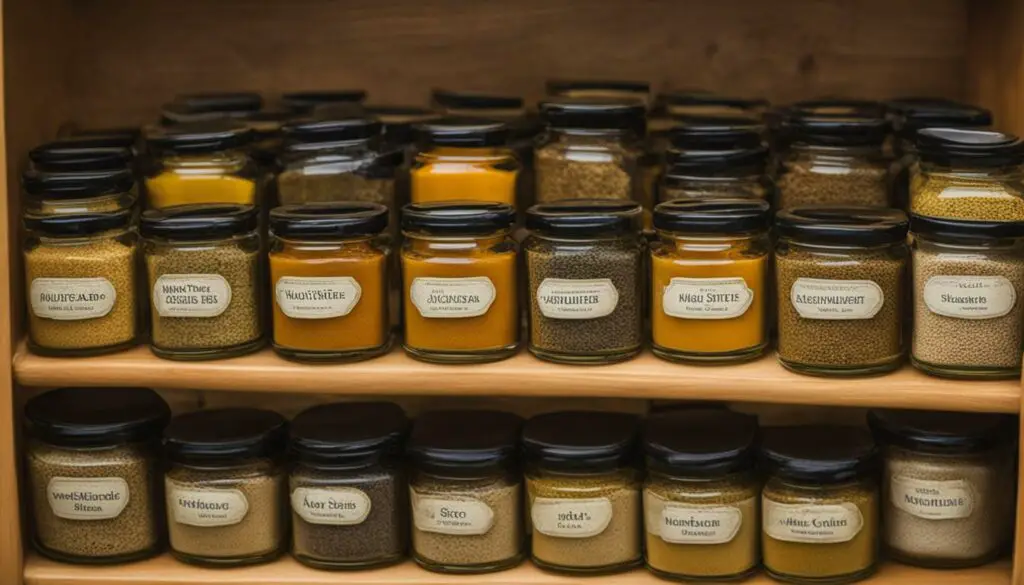
If you’re looking for a unique flavor profile, consider using other spices and seeds as a substitute for mustard seeds. Here are some popular options:
| Substitute | Flavor Profile | Uses |
|---|---|---|
| Cumin seeds | Earthy, nutty | Indian curries, soups, stews |
| Fennel seeds | Sweet, licorice-like | Marinades, dressings, Italian and Mediterranean dishes |
| Coriander seeds | Lemon-like, slightly sweet | Indian and Asian dishes, marinades, pickles |
| Caraway seeds | Anise-like, slightly sweet | Rye breads, sauerkraut, German dishes |
| Nigella seeds | Peppery, slightly bitter | Middle Eastern and Indian dishes, breads, pickles |
Experiment with these substitutes to bring new flavors to your dishes. Try combining different substitutes to create unique tastes. For example, using cumin seeds and coriander seeds in place of mustard seeds in an Indian curry can result in a different but equally delicious dish.
Experimenting with Flavors
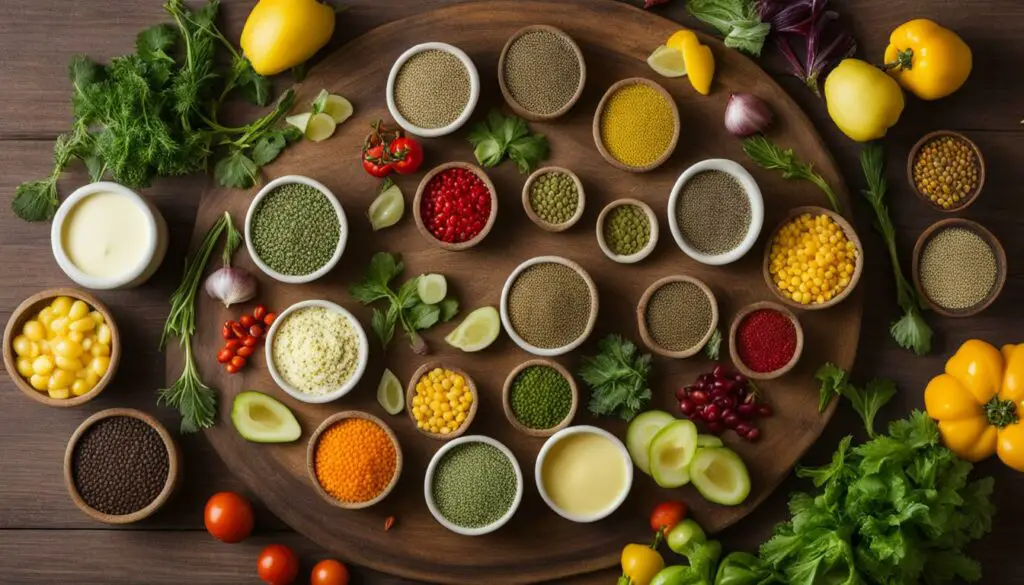
One of the most exciting aspects of substituting mustard seeds is the opportunity to experiment with new flavors in your cooking. Don’t be afraid to get creative and try out different combinations to find your perfect substitute.
For example, if you’re looking for a milder flavor, try substituting mustard seeds with a combination of mayonnaise and honey. This can be a great addition to sandwiches or dressings.
If you’re looking for a more pungent flavor, consider using wasabi or horseradish as a substitute. These options can add a kick to your dishes and pair well with meats and seafood.
Another way to experiment with flavors is by using different combinations of spices and seeds. For example, you can mix cumin, coriander, and fennel seeds to create a unique flavor that pairs well with vegetables.
Remember, don’t be afraid to get creative and have fun with your mustard seed substitutes. You may discover a new favorite flavor combination!
“Experimentation is the key to discovering new flavors in your cooking.”
Considering Allergies and Dietary Restrictions
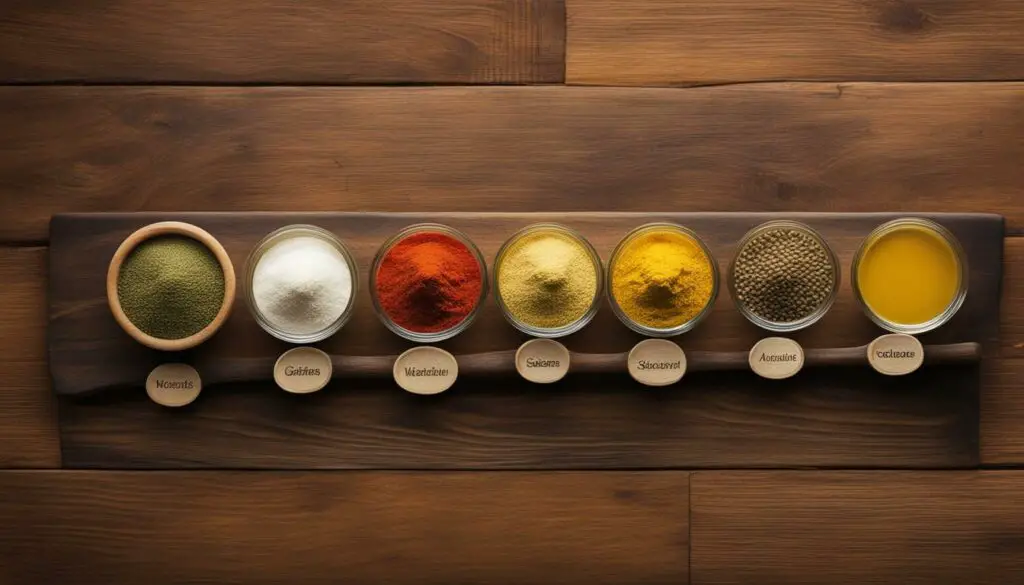
When selecting a mustard seed substitute, it’s important to consider any allergies or dietary restrictions that may be present in your household or among your guests.
For those with a mustard seed allergy, there are several alternatives that can provide similar flavors without the risk of an allergic reaction. Prepared mustard is a common substitute that can be found in most grocery stores and can be used in a variety of recipes. Mustard powder and mustard paste are also viable options that can be used to add a unique flavor to your dishes.
If you have dietary restrictions, there are also alternatives that cater to specific needs. Mustard oil, for example, is a suitable alternative for those following a vegan or vegetarian diet. It can also be a good option for those with gluten sensitivities, as it is naturally gluten-free.
Mustard Seed Allergies
| Substitute | Taste Profile | Allergen Information |
|---|---|---|
| Prepared Mustard | Similar to mustard seeds with a tangy and slightly sweet flavor | May contain traces of mustard seeds |
| Mustard Powder | Robust and pungent flavor that is slightly less intense than mustard seeds | May contain traces of mustard seeds |
| Mustard Paste | Sharp and tangy flavor with a creamy texture | May contain traces of mustard seeds |
| Mustard Oil | Distinct and pungent flavor with a nutty aroma | May contain traces of mustard seeds |
If you are unsure about which substitute to choose, consult with your doctor or allergist to ensure that you are selecting a safe alternative.
Dietary Restrictions
For those following specific dietary restrictions, there are several alternatives that can be used as substitutes for mustard seeds.
- For vegans and vegetarians, mustard oil is a suitable alternative, as it is derived from mustard seeds and does not contain any animal products.
- For those with gluten sensitivities, mustard oil is a good option, as it is naturally gluten-free.
- For those with low-sodium diets, using herbs and spices like turmeric and horseradish can provide similar flavors without the salt content found in mustard seeds.
Remember to always read ingredient labels and consult with a healthcare professional before making any significant dietary changes.
Tips for Choosing the Right Mustard Seed Substitute
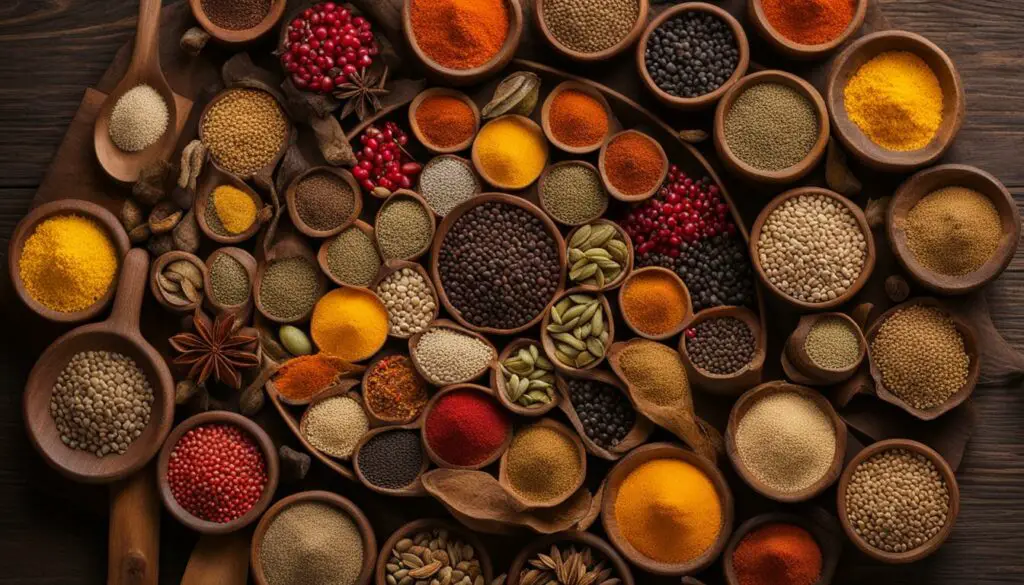
Choosing the right mustard seed substitute can significantly impact the taste of your recipe. Here are some tips to help you select the best alternative:
- Consider the flavor profile: Different substitutes will impart different flavors to your dish. Choose a substitute that complements the other ingredients in your recipe.
- Think about texture: Some substitutes, like prepared mustard or mustard paste, may have a different texture than mustard seeds. Consider how this will impact the overall texture of your dish.
- Experiment, but be cautious: While it’s great to try out new substitutes, be cautious when experimenting with large quantities. Start with small amounts to ensure you don’t overpower the other flavors in your recipe.
- Consider dietary restrictions: If you or someone you are cooking for has allergies or dietary restrictions, be sure to choose a substitute that aligns with those requirements.
- Check the recipe: Some recipes may require the distinctive flavor or texture of mustard seeds. If this is the case, it’s best to stick with the original ingredient.
By considering these factors, you can ensure that your mustard seed substitute will enhance the flavors of your recipe and impress your taste buds. Keep in mind that ultimately, the choice of substitute will depend on personal taste preferences and recipe requirements.
Conclusion
Cooking with mustard seeds can add a unique flavor and texture to your dishes. However, sometimes you may need to substitute mustard seeds due to personal preferences or ingredient availability. With the variety of options we’ve explored in this guide, you can now confidently choose a suitable mustard seed substitute based on your recipe requirements and dietary preferences.
Whether you choose prepared mustard, mustard powder, mustard paste, mustard oil, or other spices and seeds, there are plenty of ways to experiment with different flavors and elevate your cooking.
Remember to consider any allergies or dietary restrictions when selecting a substitute. With a little creativity and some trial and error, you can find your perfect mustard seed substitute and continue to enjoy delicious and flavorful dishes.
Thank you for taking the time to read our guide on mustard seed substitutes. We hope it has been informative and helpful in enhancing your culinary experiences.
FAQ
What are some common substitutes for mustard seeds?
Some common substitutes for mustard seeds include prepared mustard, mustard powder, mustard paste, mustard oil, and various other spices and seeds.
Can I use prepared mustard as a substitute for mustard seeds?
Yes, prepared mustard can be used as a substitute for mustard seeds. It offers a similar flavor profile and is readily available.
How do I use mustard powder as a substitute for mustard seeds?
Mustard powder can be used in various recipes as a substitute for mustard seeds. Simply use it in the appropriate measurements as specified in the recipe.
What is mustard paste and how can I use it as a substitute?
Mustard paste is commonly used in Indian cooking and can be a flavorful alternative to mustard seeds. You can make mustard paste at home and incorporate it into your dishes as directed in the recipe.
Can I use mustard oil as a substitute for mustard seeds?
Yes, mustard oil, derived from mustard seeds, can be used as a substitute. It adds a distinct flavor to your recipes. Use it according to the recipe instructions.
Are there any alternatives to mustard seeds other than prepared mustard, mustard powder, and mustard paste?
Yes, various other spices and seeds can be used as substitutes for mustard seeds. They impart their own flavors to the dishes. Experiment with options like cumin seeds, coriander seeds, or fennel seeds.
Can I combine different substitutes for mustard seeds?
Absolutely! Feel free to experiment with flavors by combining different substitutes for mustard seeds. This can result in unique tastes in your recipes.
What should I consider if I have allergies or dietary restrictions?
If you or someone in your household has allergies or dietary restrictions, choose substitutes for mustard seeds that align with these requirements. There are options available to suit different dietary needs.
How do I choose the right substitute for mustard seeds?
To choose the right substitute, consider the recipe requirements and your personal preferences. Some substitutes may work better in certain dishes than others. Experiment to find the most suitable alternative for your specific needs.
What are some tips for experimenting with mustard seed substitutes?
When experimenting with mustard seed substitutes, don’t be afraid to get creative! Try combining different substitutes and adjust the quantities to achieve desired flavors in your dishes.
What can I take away from this comprehensive guide on mustard seed substitutes?
With this guide, you now have a variety of mustard seed substitutes to choose from. Take the opportunity to experiment with different alternatives and elevate your culinary experience.
See also:

Leave a Reply